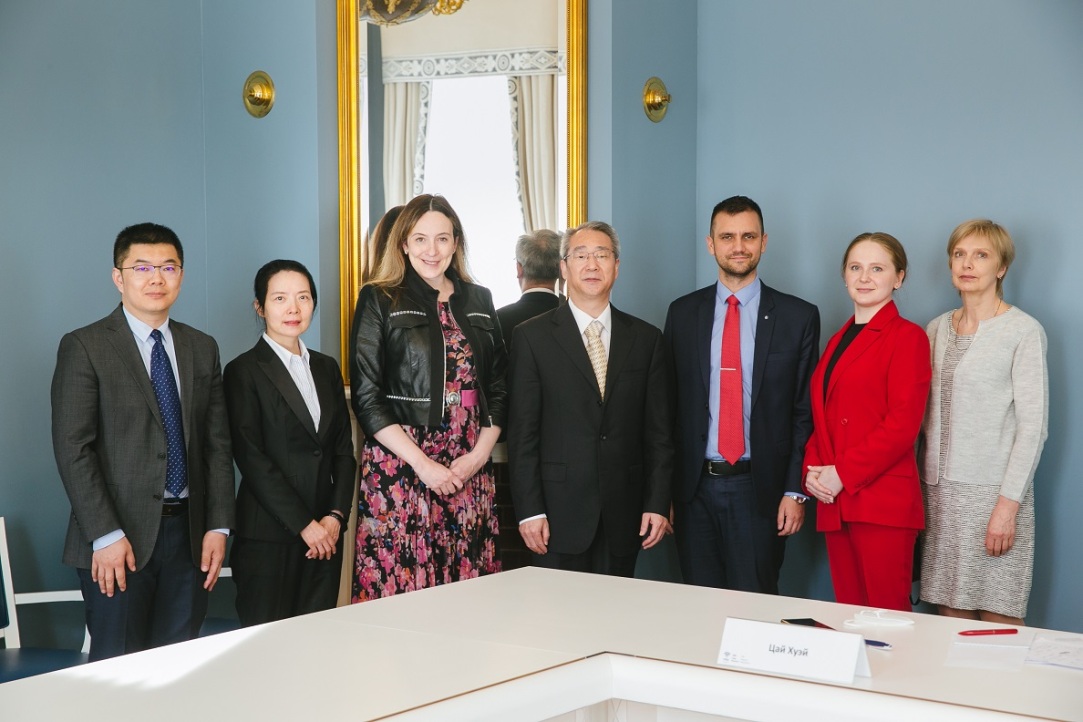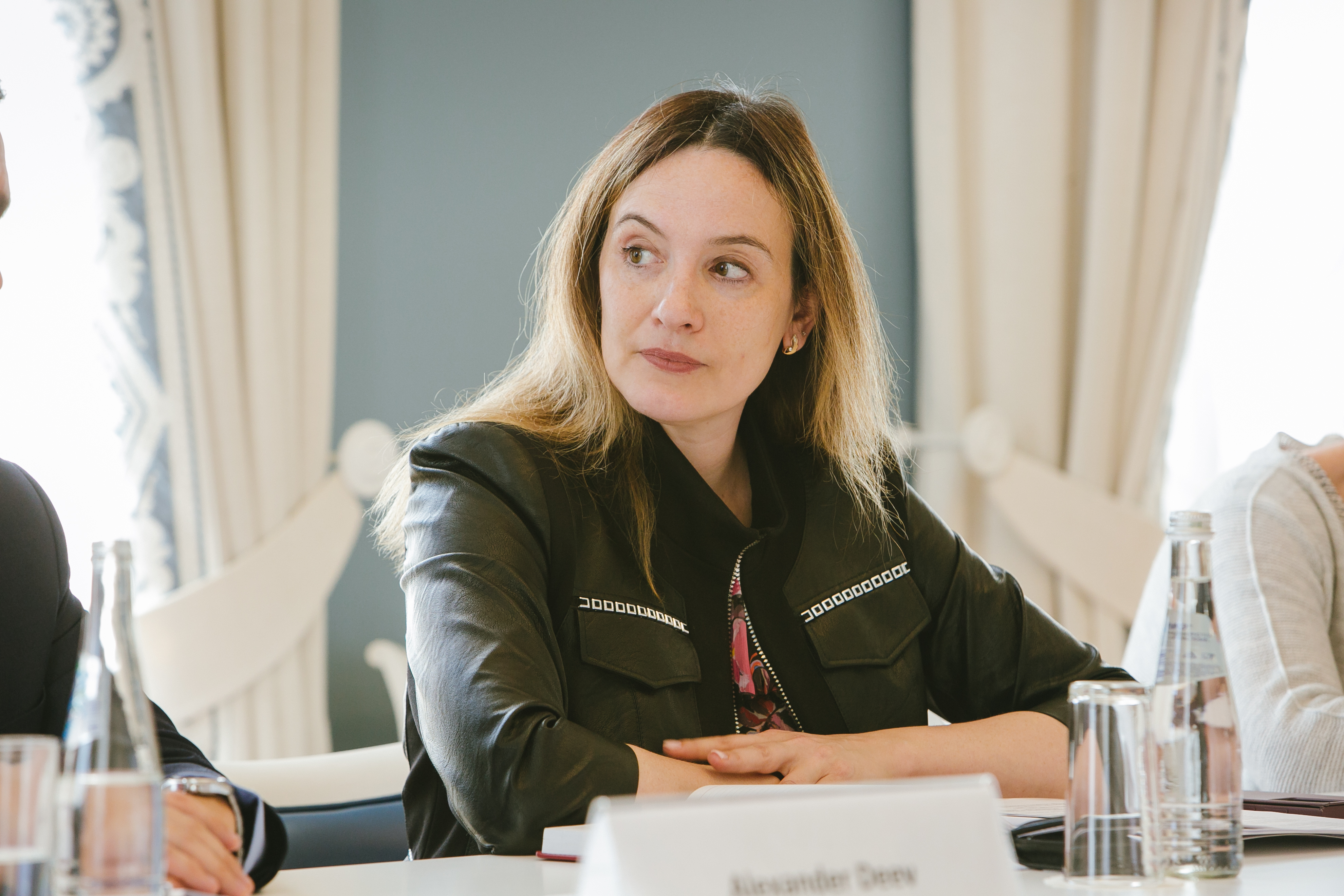HSE University Expands Cooperation with China

HSE University plans to significantly expand its cooperation with Chinese universities and schools, creating new cooperation programmes and developing existing ones. This includes plans to attract potential candidates to take part in HSE University olympiads, increase the number of Chinese students at the university, and create joint educational programmes.
A meeting between the university administration and a delegation of the Chinese embassy in Russia took place in the Pokrovka building at HSE University-Moscow. Opening the meeting, HSE University Vice Rector Victoria Panova noted the importance of establishing ties between universities and research institutes in the two countries. She stressed that HSE is one of the leading universities in Russia: in recent years, it has managed to increase its representation in international subject rankings to almost 50. HSE actively cooperates with Chinese universities, having signed 35 agreements with 23 universities, including Peking University, Tsinghua University, and the Harbin Institute of Technology. The university has 13 joint projects in fundamental research with Chinese institutions, and 214 Chinese students study at HSE.

Despite all of this, Victoria Panova is confident that there is further potential for cooperation between HSE and Chinese universities. ‘We are open to discussing options for expanding cooperation and deepening ties between educational and research institutions in our two countries,’ summarised the vice rector.
Cao Shihai, Minister Counsellor and Head of the Department of Educational Affairs of the Embassy of the People's Republic of China to the Russian Federation, expressed his gratitude to HSE University for providing assistance to Chinese students during the pandemic and noted that the university is popular in China. The diplomat emphasised that China pays special attention to cooperation in the field of education. According to the minister counsellor, more than 3,000 agreements have been signed between the two countries and 13 Russian-Chinese university associations have been created. In recent years, 116 joint educational institutions and projects have been organised.

Cao Shihai said that HSE is a young university that has achieved great results. ‘We will be very happy to facilitate cooperation between HSE University and Chinese partners,’ he said.
He also noted the growth in mutual interest in language studies. Around 120,000 school and university students in China study Russian, while roughly 113,000 Russian students study Chinese. Cao Shihai highlighted the ongoing expansion of Chinese-language teaching at HSE University and expressed his willingness to expand cooperation in studies of the language.
Victoria Panova stressed the importance of expanding joint programmes with leading Chinese universities such as Peking University and Tsinghua University.
HSE University is interested in joint master’s programmes in socioeconomics, the humanities, and the natural sciences. Victoria Panova told the Chinese delegation about the university’s global leadership in a range of fields: the HSE University programming team consistently wins prize places in international olympiads, while HSE MIEM trains outstanding engineers, mathematicians, and electronics specialists. The university also has strong biology, neurobiology, cognitive and neuroscience, geography, and physics faculties.
The vice rector also proposed an initiative to prepare joint Russian-Chinese research periodicals.
Victoria Panova highlighted HSE University’s readiness to develop the teaching of Russian language in Chinese universities, facilitating academic exchanges with universities with strong Russian-language departments, and offering assistance to universities that would like to improve their Russian-language competencies. She also proposed inviting teachers from China to teach Chinese.
Another likely area of cooperation between HSE and Chinese universities is the MBA course. Victoria Panova noted that the course can be taken in both Chinese and English.
The vice rector also invited Chinese students to take part in university’s annual summer schools. In light of this, it is important that information about the university is widely disseminated in China. ‘This would be good and useful for both parties. We are happy to admit Chinese school students to study at our university,’ she said. She also proposed holding joint Russian-language olympiads in China in order to objectively assess the knowledge of Chinese school students.
Victoria Panova highlighted that Chinese social media is an important element of communicating with students and applicants—one which could replace Western equivalents in this turbulent period. Alexander Deev, Director of International Admissions at HSE University, added that the embassy’s help is vital in promoting HSE’s social media pages and making them better known to potential applicants.
According to Cao Shihai, the education of doctoral students at Russian universities is a priority area for China. He proposed expanding the education of Chinese doctoral students at HSE University in various subjects and appealing to more Chinese students and candidates to take part in the university’s olympiads. ‘We should maintain ties in order to learn about such events in time and tell Chinese students about them,’ he said. He also supported the idea of launching joint Russian-Chinese research publications.
‘We hope that prestigious and strong fields for Chinese students will be more open at Russian universities, and likewise for Russian students in China. This will allow us to jointly train sought-after, highly qualified specialists in various fields of science and research,’ he explained.
The Chinese diplomats thanked HSE University for the initiatives proposed and suggested a joint cooperation project of their own: organising summer camps in Russia and China for students from each other’s countries.
The parties also discussed the idea of conducting a joint conference between HSE and leading Chinese universities on priority scientific areas. Victoria Panova believes that this will help to find new areas of cooperation and contact, as well as organise new bilateral projects.
After the meeting, the Chinese delegation was given a tour of one of the buildings of the HSE University campus on Pokrovsky Bulvar: the Durasov House, which is a cultural heritage site.
Alexander Deev
See also:
HSE Participates in Conference on International Exchange of Professionals in China
From October 21 to 24, 2025, the 23rd Conference on International Exchange of Professionals took place in Shanghai and Beijing, bringing together more than 7,000 scientists and experts from around the world. HSE University was represented by Ivan Arzhantsev, Dean of the Faculty of Computer Science, and Vasily Gromov, Head of the Laboratory for Semantic Analysis of the Centre for Language and Semantic Technologies.
‘It Was Interesting to See How Our Chinese Colleagues Work’: HSE Researchers Take Part in Hefei Summer School
This summer, Diana Sukhoverkhova, Daria Mazur, and David Kagramanyan, research assistants at the MIEM HSE Laboratory for Computational Physics, spent five weeks in China. At the Future Scientist Exchange Program (FuSEP) summer school in Hefei, they worked in new fields of science together with their Chinese colleagues. HSE's promising scientists spoke to the HSE News Service about their intense and productive time in China.
Works of HSE Art and Design Students Presented at Pingyao International Photography Festival
On September 19, the 25th Pingyao International Photography Festival (PIP) opened in Pingyao, Shanxi Province, China. The exhibition features the works of 16 students of the Faculty of Creative Industries at the HSE Art and Design School, selected following the results of the HSE Creative Open / Photoproject international competition, which received more than 300 entries.
‘I Wish Summer Were Quarterly’
Practicing and teaching yoga, chilling in Moscow parks, writing academic papers, travelling around Russia, and volunteering—these are only a few of the things HSE international students have tried over their summer break. Now, as they are getting back to studies, the students reflect on their summer experiences in academic work, professional development, travel, and leisure.
Ringing in the New Term
On September 1, campuses across Russia ring in the new academic year with the traditional ‘first bell’—flowers for teachers and welcomes for first‑years—while international students at HSE University share how studies begin in their home countries, from Ghana’s Akwaba week to China’s student club fair, the Democratic Republic of the Congo’s blue-and-white uniforms, and India’s Teachers’ Day.
HSE and China’s Top Universities to Launch Large-Scale Research and Education Projects
As part of the official visit of Russian President Vladimir Putin to the People’s Republic of China, the HSE delegation led by Rector Nikita Anisimov concluded new cooperation agreements with major Chinese universities. The agreements are designed to expand bilateral partnerships in education, science, and cultural exchange.
HSE Shares Its Experience of Urban Strategies at International Summer School in China
In the context of intensifying global geopolitical and technological competition, leading Chinese educational institutions—Zhejiang International Studies University and Peking University—organised an International Summer School. Their joint programme focused on studying global, regional, and urban development strategies. The HSE Faculty of Urban and Regional Development took part in this event.
How to Build a Business in the New Reality of the Chinese Market
At the international SPROUTS Business Forum in Kazan, Prof. Natalya Guseva of HSE University, Head of the ‘Eastern Perspective: Doing Business in China in Practice’ educational programme for entrepreneurs and managers, delivered a keynote address entitled ‘Competing with China: Why Old Skills Are No Longer Enough’ during a Russian–Chinese business session. Her talk attracted a large audience of business representatives, exporters, and government officials.
AI and Chinese Culture Day: HSE University Welcomes Students and Postgraduates from Tsinghua University
In July 2025, HSE University hosted a group of young scholars from Tsinghua University. During their visit, they attended a lecture on the latest developments in artificial intelligence at the Faculty of Computer Science and held workshops for HSE students as part of Chinese Culture Day.
HSE University Strengthens Ties with Peking University
On July 21, 2025, representatives from Peking University led by Zhang Jin, Vice President of Peking University and Chancellor of Shenzhen Graduate School, paid a visit to HSE University. The delegation included forty students, teachers, and administrators. During their visit, leaders from both universities discussed potential areas for future collaboration, and representatives from three HSE University departments held meetings with Chinese students.


